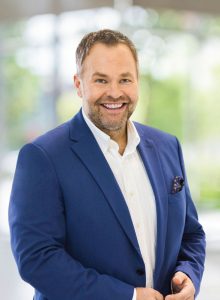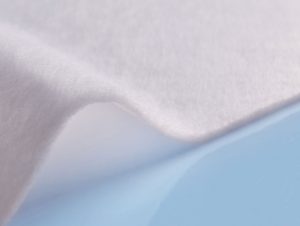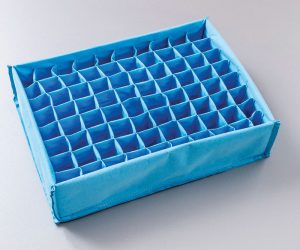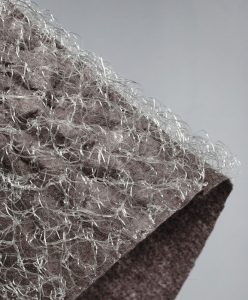
Textile World recently spoke with Dr. Andreas Raps, the newly appointed CEO of Freudenberg Performance Materials.
TW Special Report
The Germany-based Freudenberg Group originally began as a tannery in 1849. Over the past 175 years, the company has grown and evolved into a global technology company providing products, services and solutions to its customers. The company is celebrating this milestone birthday under the tagline “Curious Since 1849.”
Freudenberg comprises some 10 business groups— making products across 40 market segments for thousands of different applications — and among them is the Freudenberg Performance Materials group. The focus of Freudenberg Performance Materials is innovative technical textiles that are used in a myriad of markets including apparel, auto-motive, building materials, energy, filter media, healthcare, footwear and leather goods. The business group— with its 32 manufacturing sites in 14 countries employing 5,100 people —generated sales of more than 1.4 billion euros ($1.51 billion) in 2023.
Dr. Andreas Raps became the CEO of Freudenberg Performance Materials in January 2024. While he is new to this role, he is in his twentieth year with the company and joined the executive council back in 2020. Textile World recently had the chance to speak with Dr. Raps to learn more about the company as well as his thoughts about the current business environment and keys for success, among other topics. Dr. Raps said that while this is a new position for him, he is very familiar with the company after spending 20 years as an employee — although his 20 out of 175, he noted with a smile, is not so much.
TW: What makes Freudenberg unique in the textile/performance materials sector?
Dr. Raps: We are celebrating a special birthday this year — 175 years of Freudenberg, which is really a wow! I’m really happy to talk about why Freudenberg Performance Materials is unique. Our innovation strengths, research and development capabilities, our broad technology platform —one of the broadest in the industry — and our global footprint make the company unique. We are a full solutions provider. Then last, but not least, our outstanding teams. Our people really make the difference and I’m very proud to be the CEO of Freudenberg Performance Materials. I’m traveling a lot right now and I meet many new faces every single day. I receive very warm welcomes and we have very open and trusting discussions that underline our culture is a very special one.

TW: What are the company’s greatest strengths and how do you differentiate from competitors?
Dr. Raps: When we talk about differentiation from our competitors, I would say we start with customer centricity. Freudenberg would not have survived 175 years without listening to and anticipating the customer’s voice. My philosophy is to start with the pain points of customers and develop valuable solutions that meet their needs. I really think when we talk about innovation capabilities, we have a very good value proposition.
Also, our global footprint allows us to follow a local-for-local strategy. Our approach is always to serve local markets with local footprint. In addition, the Performance Materials group is part of the family-owned, long-term-oriented and financially solid Freudenberg Group. This presents us with a lot of opportunities. We are in a safe harbor. We are not looking into quarterly developments, but more long-term topics.
TW: Recently the Freudenberg Group shared that it had achieved record profits in 2023. What do you believe were the keys to this success? How did the textile segments con-tribute to the company’s overall success?
Dr. Raps: As a member of the executive council of Freudenberg Group, I can tell you that we are a diverse technology-driven company that transforms in-depth expertise into added value solutions for our customers, who appreciate those partnerships. I repeat myself, but those partnerships are for the long run. We are not looking into single points of supply. We are in partnerships for decades and I think this makes a difference.
I would say Freudenberg Performance Materials had a reasonable year overall. We saw strong performance in some segments such as gas diffusion layers for fuel cells, condensation control and healthcare.
In 2024, we have faced severe headwinds due to geopolitical circumstances and rising interest rates that lead to hesitation, for instance. As we all know, the global building and construction industry was particularly affected. But as a diverse company, we remain a strong, reliable partner. We need to be cautious, but we can also use this time to work on our homework and prepare the company for the future.

TW: As Freudenberg grows its manufacturing capability for medical products, does this provide an opportunity also for the textile segment?
Dr. Raps: Freudenberg Medical is one of 10 business groups within the Freudenberg Group, just like Freudenberg Performance Materials. Our colleagues have strong expertise in extrusion and shaping thermoplastic and silicone components.
In our case, it’s about performance materials — basic, high-performance nonwovens and polyurethane foams. We began some 20 years ago in basic wound care and today are active in advanced wound care where we offer highly technical and sophisticated solutions. We have some exclusive partnerships with customers where we have very interesting development projects. For instance, when you talk about chronic wounds, a certain environment is needed to manage the wound, such as humidity. Products from Freudenberg Performance Materials support applications like that. It’s a very exciting area and we have a very highly dedicated and passionate team happy to add value in this arena.
TW: How does the company determine its global manufacturing footprint and where to make investments?
Dr. Raps: I already mentioned that one of our basic philosophies is local-for-local, which has been our approach for decades. For instance, we entered our first partnership in Japan in the 1960s. We are active on most of the major continents with a significant footprint. Today, we operate 32 production sites around the world. The majority still are based in Europe, but North America and Asia are exciting markets as well. We consider North America an exciting market with reasonable growth. We currently are building a new line in Vietnam for recyclable wadding products, and also a new line in India. We have a duplication of our technologies across the globe enabling us to offer the same technologies from different regions. This makes us a valuable partner for global businesses.
“We can bring positive change through our handprint — by using recycled materials, being energy efficient or by helping customers to reduce their own resource consumption.” — Dr. Andreas Raps
TW: As a leading company in the nonwovens sector, what developments are key to the future of the business?
Dr. Raps: We think that joint innovations with our customers will be a key success factor for the future. Also, when talking about the future, I think if we can make our customers successful, especially in the arena of sustainability, then it’s more than a justification for us to be committed in this area. We see sustainability and commercial aspects not as a contradiction, but things that go hand in hand with each other.
I also want you to know that when we talk about sustainability, in Freudenberg’s case, it’s not just a buzzword. We started the sustainability journey decades ago and have real stories to tell. In the early 1990s, we were a pioneer in recycling PET bottles that we turned into flake to reuse in our processes. Today, we have recycling lines in almost all of our major production locations and blend virgin materials with recycled inputs. As a company, we have retained, internalized and improved the idea of upcycling.
We also like to differentiate and talk about handprint and footprint when we talk about sustainability.
The ecological footprint shows the extent to which production impacts the environment by measuring the consumption of energy and raw materials as well as the resulting carbon dioxide emissions; while the ecological handprint questions how sustainable and environmentally friendly our product is.
This means we focus not only on our own consumption and emissions, but also on whether and how our products and services can help our customers to be more sustainable. We can bring positive change through our handprint — by using recycled materials, being energy efficient or by helping customers to reduce their own resource consumption.

Using pioneering technologies, the company manufactures products for a wide range of applications from clothing, roofing and cars to highly complex wound care. We offer innovative solutions for all these and many other areas and are constantly developing them further. In doing so, we ensure that our products are developed, produced and distributed as sustainably as possible. After all, the future of our industry can only be secured in the long term with a resource-conserving, hands-on approach.
I believe that if you want to remain competitive in the long term, you have to ask yourself the same questions. There are alternatives to the materials you have been using — you just have to use them!
TW: Are there any factors that concern you with regards to successfully maintaining and growing Freudenberg’s future?
Dr. Raps: Increasing regulation and bureaucracy are an issue. But our approach is to focus on the things we can influence. When we have threats such as this, we can also make them into an opportunity. I think the industry in general is not in very good shape right now, but we do think there are some positive silver linings on the horizon.
TW: Can you tell readers a little more about Freudenberg Performance Materials in the United States?
Dr. Raps: We have some good footprints in the United States. We have good footprints in Durham and Asheville in North Carolina, and also in Macon, Ga. We have some minor sales offices as well. Our main customer base is in the Atlanta area.
We are looking for M&A opportunities because we are committed to grow in the United States. We have a great team there and we can digest more business and we are ready for that. And you know with our technology portfolio, I think we have a good technology offering for the market. We see high loyalty from U.S. customers as well, so we have a good match with our let’s say technology driven approach and our technical expertise. We feel highly appreciated by the U.S. customers.
2024 Quarterly Volume III




